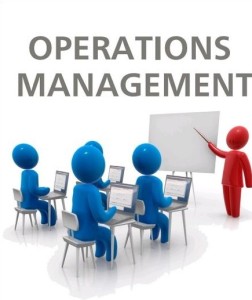What is an MBA in Operations Management?
 As today’s business professionals an students look for graduate programs, one of the most popular concentrations comes in the form of an MBA in operations management. This degree is designed to combine advanced management skills and a solid understanding of what it means to be oversee supply-side efficiency, budgets, and overall performance. In an increasingly global economy and one that depends on operational efficiency, this degree makes real sense for those who are focused on performance metrics, smaller details of manufacturing and business operations, and the savings that might be gained via outsourcing, labor practice policy changes, and much more, according to Business Week.
As today’s business professionals an students look for graduate programs, one of the most popular concentrations comes in the form of an MBA in operations management. This degree is designed to combine advanced management skills and a solid understanding of what it means to be oversee supply-side efficiency, budgets, and overall performance. In an increasingly global economy and one that depends on operational efficiency, this degree makes real sense for those who are focused on performance metrics, smaller details of manufacturing and business operations, and the savings that might be gained via outsourcing, labor practice policy changes, and much more, according to Business Week.
Operations Students Begin with a Management and Administration Core
The MBA in Operations Management still focuses extensively on the high-level management skills needed to assume advanced managerial or executive positions in today’s largest businesses. Because of this universal focus, students will be expected to take a few universal, core classes that emphasize these skills. Mostly, operations students will focus on executive leadership, e-business management, supply chain management, marketing management, executive finance and accounting, and information management. Each of these classes will focus on a different area of the industry and give future business leaders a versatile set of skills that allows them to ease into virtually any position.
As with all MBA concentrations, however, students will graduate with more than just a generalist set of advanced management skills. Thanks to the focus on operations and the supply chain, a more specific set of courses will teach students how to effectively manage inventory, manufacturing processes, and other considerations that are key to reducing overhead while boosting profitability.
Operations Management Courses: A Look at What Students Can Expect to Learn
The supply chain is an integral part of modern business, and one area where many businesses are starting to reconsider decisions made decades ago during an outsourcing craze. In recent years, numerous companies have begun “on-shoring” parts of their supply chain as they come to understand that domestic production often leads to better economic numbers, higher quality, and improved product support. This is something that only those with an MBA in the field of operations management would understand.
In order to understand exactly how things like manufacturing, important and exporting, outsourcing and “on-shoring” work, students in this MBA concentration focus on management of the supply chain. They learn about the raw cost of materials, the economic factors of domestic and international production, and the benefits of scale when it comes to driving down product and material costs. Courses in advanced operations management show MBA candidates how to effectively manage individual manufacturing operations, how to strike up contracts with manufacturing sites, and how to find the right combination of labor cost and quality for new and existing products. By the conclusion of these concentrated courses, students will be able to advance into a high-level management position that deals specifically with the supply chain and business operations. They may even be primed for executive-level leadership. Students need only to look at Tim Cook as a shining example, who transitioned from the head of Apple’s operations to its CEO over the course of his career with the company.
Related Resource: Joint MBA
Great Opportunities Await Operations Management MBA Grads
Students who are looking to craft the most powerful resume in a competitive business sector should consider the supply chain as a source of differentiation. Today’s universities are increasingly offering a highly specific MBA in Operations Management that will give students a unique set of skills, and a strong management background, as they seek long-term careers in the corporate sector.


